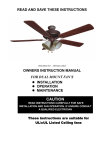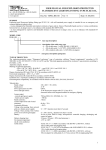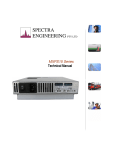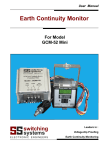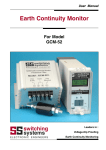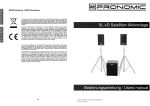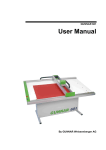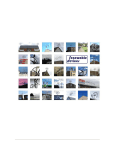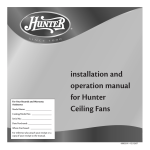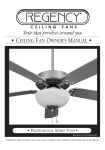Download Design House 153791 Installation Guide
Transcript
READ AND SAVE THESE INSTRUCTIONS 153791 OWNERS INSTRUCTION MANUAL FOR DUAL MOUNT FAN’S INSTALLATION OPERATION MAINTENANCE CAUTION READ INSTRUCTIONS CAREFULLY FOR SAFE INSTALLATION AND FAN OPERATION. IF UNSURE CONSULT A QUALIFIED ELECTRICIAN These instructions are suitable for UL/cUL Listed Ceiling fans TABLE OF CONTENTS Safety Tips -----------------------------------------------------------------------------------2 Unpacking Your Fan ----------------------------------------------------------------------3 Material Required ---------------------------------------------------------------------------4 Electrical Outlet box------------------------------------------------------------------------4 Install Mounting Bracket------------------------------------------------------------------5 Installing the Fan-----------------------------------------------------------------------------6 Electrical connections----------------------------------------------------------------------9 Blade Attachment---------------------------------------------------------------------------10 Installing Light kit---------------------------------------------------------------------------11 Operation--------------------------------------------------------------------------------------12 Maintenance----------------------------------------------------------------------------------13 Trouble Shooting---------------------------------------------------------------------------14,15 Part List----------------------------------------------------------------------------------------16 Page 1 SAFETY TIPS TABLE OF CONTENTS 1. To avoid possible electric shock, turn off the electricity at the main fuse box or circuit panel before you begin the fan installation or before servicing the fan or installing accessories. 2. CAUTION: READ ALL INSTRUCTIONS AND SAFETY INFORMATION CAREFULLY BEFORE INSTALLING YOUR FAN AND SAVE THESE INSTRUCTIONS. 3. Make sure all electrical connections comply with local codes or ordinances and the national electrical code. If you are unfamiliar with electrical wiring, please use a qualified and licensed electrician. 4. Make sure you have a location selected for your fan that allows clear space for the blades to rotate, and at least seven (7) feet of clearance between the floor and the fan blade tips. The fan should be mounted at least thirty (30) inches from walls or other upright structures. 5. WARNING: The outlet box and ceiling support joist used must be securely mounted, and capable of supporting a minimum of 50 pounds. 6. WARNING: To reduce the risk of fire, electrical shock, or personal injury mount to outlet box marked” Acceptable For Fan Support” and use mounting screws (and locked washers) provided with the outlet box. 7. Electrical diagrams are for reference only. Light kits that are not packed with the fan must be UL listed and marked suitable for use with the model fan you are installing. 8. After installation is complete, check that all connections are absolutely secured. 9. After making electrical connections, spliced conductors should be turned upward and pushed carefully up into outlet box. The wires should be turned spread apart with the grounded conductor and the equipment-grounding conductor on one side of the outlet box. 10. WARNING: To reduce the risk of fire, electrical shock. Do not use this fan with any solid-state fan speed control device, or rheostat. 11. Do not insert anything into the fan blades while they are rotating. 12. WARNING: To reduce the risk of personal injury, do not bend the blade brackets when installing the brackets, balancing the blades, or cleaning the fan. Do not insert foreign objects in between rotating fan blades. 13. To avoid personal injury or damage to the fan and other items, be cautious when working around or cleaning the fan. 14. Do not use water or detergents when cleaning the fan or fan blades. A dry dust cloth or lightly dampened cloth will be suitable for most cleaning. 15. Instructions for supply connections: conductor of a fan identified as grounded conductor to be connected to a grounded conductor of power supply, conductor of fan identified as ungrounded conductor to be connected to an ungrounded conductor of power supply, conductor of fan identified for equipment grounding to be connected to an equipment-grounding conductor. NOTE: The important safety precautions and instructions appearing in this manual are not meant to cover all possible conditions and situations that may occur. It must be understood that common sense and caution are necessary factors in the installation and operation of this fan. CAUTION: To reduce the risk of injury to person, install fan so that the blade is at least 2.1 Meters (7 Feet) above the floor. Page 2 UNPACKING SAFETY YOUR TIPS FAN 1. 2. Unpack your fan and check the contents. Do not discard the carton. If warranty replacement or repair is ever necessary the fan should be returned in original packaging. Remove all parts and hardware. Do not lay motor housing on its side: the decorative casting may shift. Examine all parts. You should have the following: 1. 2. 3. 4. Mounting Bracket Downrod/Ball assembly Ceiling canopy Fan Housing Motor, and switch housing. Remove rubber shipping spacers from motor. Keep them in case you need to return fan. 5. Set of Blades 6. Blade Arms 7. Light Kit 8. Glass 9. Adaptor 10. Cap 11. Decorative nut 12. Parts Pack Containing: A/ Mounting bracket hardwares (wire nuts) B/ Blade attachment hardwares (screws with washers for each blade). C/ Blade arm attachment hardware (motor screws and lock washers may already be in fan motor) D/ Pull chain/Ball Page 3 TOOLS AND MATERIALS REQUIRED *Phillips screw driver *Blade screw driver *Adjustable pliers or wrench *Step ladder *Wire cutter *Electrical tape ELECTRICAL OUTLET BOX 1. If there is an existing outlet box, ensure it is clearly marked” Suitable For Fan Support”. If not, it must be replaced with an approved one. 2. Secure the outlet box (or make sure the existing box is secured) directly to the building structure. Use appropriate fasteners and building materials. Wood joist and outlet box must be able to support a minimum of 50 pounds. 3. Figure 1,2 and 3 are examples of different ways to mount the outlet box in different ways to mount the outlet box in different situations. A longer down rod may be required in sloped ceiling situations to maintain proper blade clearance. 4. To hang the fan in locations where no ceiling joists is available. A hanger support bar may be required (Fig. 4) Outlet Box Outlet Box Fig.1 Fig.2 Provide Strong Support Recessed Outlet Box Ceiling Mounting Plate Outlet Box Fig.3 Fig.4 Page 4 INSTALL MOUNTING BRACKET 1. To avoid possible electrical shock, be sure electricity is turned off at the main power panel before wiring. All wiring must be in accordance with National and Local Electrical Codes, and the ceiling fan must be grounded as a precaution against possible electrical shock. 2. Attach hanger bracket to outlet, box using screws provided with the outlet box (Fig. 5) UL LISTED ELECTRICAL OUTLET BOX “ACCEPTABLE FOR CEILING FAN ONLY” HANGER BRACKET SPRING WASHER (PROVIDED WITH OUTLET BOX) SCREW (PROVIDED WITH OUTLET BOX) Page 5 SELECT TYPE OF INSTALLATION INSTALLING THE FAN HANG DOWN STYLE 1 Slide the canopy on the downrod(Fig.6) Thread the power leads from the fan through the canopy and downrod. Take extra care not to pull on power wires. Damage and loose connections could result from any abnormal pressure on these wires. Set downrod into downrod collar yoke. Route until the holes match. Being careful not to damage wiring, insert connector pin through the holes (See Fig. 6A. 6B). Secure the pin by inserting the stop pin through the connector pin. Downrod Power leads Mounting Collar Yoke Connecting Pin Ball Downrod Fig.6A Stop Pin Canopy Fig.6 Fig.6B WARNING: Do not force connector pin through downrod. Use of force could cause damage to wires inside. Make sure the stop pin is properly engaged to prevent it from falling out. 2 Tighten downrod setscrew. Some models have a locknut for the setscrew. To insure the setscrew fully seats against the downrod. It is necessary to back off the locknut until it contact the setscrew head prior to tightened the setscrew. When setscrew is tightened against downrod.locknut should then be tightened against connector yoke. Some models have 2 downrod setscrews. Repeat for both (Fig.7) Page 6 DOWNROD SETSCREW Lock Nut Motor Setscrew Fig.7 3. Tighten motor set screw. Check the strength of this connection (pre-tightened at factory) by holding the motor housing in position and turning the downrod counter clockwise. If this connection slips, retighten motor setscrew and locknut. Follow the same procedures as mentioned above for downrod setscrew. 4. Install ball into hanger bracket opening. The tab opposite of the hanger bracket opening should fit in slot on ball (Fig 8) . Hanger Bracket Tab Safely Cable(For cUL_listed fan only) Ball Ball Slot Fig.8 5. Make wire connections (refer to section titled” Electrical Connections”) For cUL-listed fan, please secure the safety cable to the junction box. 6. Slide canopy up, and fasten to hanger bracket with the 4 screws provided. WARNING: To avoid damaging the blade arms and blades, do not install either until fan is fastened to ceiling. To avoid motor shift, handle fan by downrod or switch housing only. Page 7 HUGGER STYLE 1. Put 2 screws in the hanger bracket. Leaving them partially out. (Fig. 9.1). 2. Remove three of the six screws and lock washers (every other one) from the top housing (Fig. 9.2) 3. Place the ceiling canopy over the collar on the top of the motor housing. Align the mounting holes with the holes in the motor and fasten, using the three screws and lock washers which are removed in Step 2 (Fig. 9.3) 4. Move the fan assembly up and connect the wires from fan to the wires from ceiling. (Fig. 9.4) 5. Make wire connections (refer to section titled” ELECTRICAL CONNECTIONS”) For cUL-listed fan, please secure the safety cable to the junction box. 6. Place the canopy up on the hanger bracket by inserting the slotted opening of the canopy on the screws. (Fig.9.5) 7. Insert the remaining screws through the remaining canopy holes and tighten all 4 screws. Screw and Lockwasher (3 of 6 places) Screws Mounting bracket Fig.9.1 Fig.9.2 Screw and Lockwasher (last 3 places) Upper Canopy Fig.9.3 Fig.9.4 Slotted Hole Page 8 ELECTRICAL CONNECTIONS 1. Four wires are connected to the top of the fan. Black: ” Hot” Power/Live for the fan Blue: “ Hot” Power/ Live for the light kit White: “Common”/Neutral for the fan and the light kit Green/Green & Yellow: “Ground” /Earth wire 4. Fan controlled by pull chain switch. Light controlled by chain switch on light BLK Power lines 120 v WH GREEN GROUND Light controlled from wall switch. Fan controlled by pull chain Wireing Box Power lines 120 v WH 3. If the fan and light are connected to the same circuit, the black and blue wires should be connected together to the black wire in the ceiling using a wire nut to make the connection. The white wire from the fan should be connected to the white wire in the ceiling, using a wire nut to make the connection. The green wire from the fan should be connected to the ground wire in the ceiling, using a wire nut to make the connection. BLK 2. Green Ground BLK Light Switch Ground to mounting bracket FAN BLUE BLK FAN BLUE BLK WH WH Power lines 120 v WH Wireing Box Green Ground BLK Fan BLK Ground to Downrod on mounting bracket WH RED BLUE Light WH WH LIGHT FITTER LIGHT FITTER Fan and light controlled by independent wall switches. Ground to mounting bracket WH RED BLUE BLK WH BLUE Wire Box FAN BLUE BLK WH WH LIGHT FITTER Page 9 BLADE ATTACHMENT 1. 2. 3. 4. Place screw through the blade and start the screw into the blade arm repeat this procedure without tightening the screw until all 3 screws have been started into the blade arm (Fig.11). As most fan use concealed screw blades arms, screws may not go through the whole blade arms. Tighten each screw starting with center screw. Fasten blade assembly to motor with provided screws. Repeat procedure for remaining blades. (Fig. 11A) Make sure the blades are more than /at least 7 feet from the floor, avoid any object in the path of the blades. SCREWS BLADE BLADE ARM Fig.11 Attach 4(5 or 6) blade assemblies to motor using the 8(10 or 12) screws provided Make sure all screws are tightened securely. Blade assembly Blade mounting screws and washers Fig.11A Page 10 INSTALLING GENERAL TURTLE LIGHT KIT (OPTIONAL) 1. 2. Locate two wires in the switch housing (white and blue labeled “ for light”). Connect them to the light kit wire connectors (Fig. 12) White to white Blue to blue Secure all splices with electrical tape to prevent connectors from vibrating loose during fan operation. 3. Carefully push all wires back into the switch housing. Then attach housing cover plate to switch housing with the 3 screws provided. 4. Attach the glass shades to the light kit, using 3 thumb screws per shade (provided). Do not over-tighten the thumb screws as glass may break. Install (40 watt max). light bulbs (not provided). Glass shade & thumb screws are not provided on the spot light fan. 5. Restore power and your light kit is ready for operation. 6. If the light kit does not work, turn off the electricity and lower the canopy on your ceiling fan. Make sure the blue wire is connected to black household wires (please refer to electrical connections section in this manual). WARNING: All suspended fan (not hugger) with 190W light limiter. If the total wattage of the light bulb (s) is more than 190W, the light is OFF until the total wattage reduce to below 190W. This light kit is for reference only, some model get different light kit, but they are installed in similar way Page 11 INSTALLING DISC BOWL LIGHT KIT(OPTIONAL) 1. Remove switch housing screws and then remove bottom cap of switch housing shell on fan. 2. Locate two wires in the switch housing (white and blue labeled “ for light”). Connect them to the light kit wire connectors White to white Blue to blue Secure those wires with wire nuts in the fan. 3. Carefully push all wires back into the switch housing. Then attach housing cover plate to switch housing with the 3 screws provided. 4. Install light bulbs, (40 watt max) , to the lampholder. . Light bulbs (not provided). 5. Attach the glass shades to the light kit, and screw up the finial. Do not over-tighten the finial , glass may break. Slide the bowl glass over the threaded nipple, followed by the cap, and then finial. Twist finial clockwise until snug (see figure Lower chains thru hole in bowl and glass cap. Attach chain extension 6. 7. 8. 9. Restore power and your light kit is ready for operation. If the light kit does not work, turn off the electricity and lower the canopy on your ceiling fan. Make sure the blue wire is connected to black household wires (please refer to electrical connections section in this manual). Page 12 OPERATION 1. 2. 3. Restore electrical power by turning on the electricity at the main fuse box. Turn on the wall switch. Your fan has two controls on the switch housing SPEED CONTROL Pull Chain Switch (Tug gently) Pull Speed 1 High 2 Medium 3 Low 4 Off Switch Box DIRECTION CONTROL Reverse Slide Switch (Up and down) Up for upward air flow to recirculate air upward Down for downward air flow for a cooling effect NOTE: ON FANS WITH 3 SPEEDS: 1 Pull-High 2. Pull-Medium 3. Pull-Low 4 .Pull-Off Turn off and let fan stop before changing setting of the reverse slide switch. Your ceiling fan is a sensible choice to cool as well as help you warm your living area. You will have a reduction in both heating and cooling costs by regular use of your fan. In summer, put the reverse switch in the forward position so air is blown down, producing a cooling breeze. In winter, reverse the fan so an upward airflow will push warm air off the ceiling and balance the temperature in the room. In winter, run the fan at lower speed than in the summer. SUMMER WINTER DOWNDRAFT UPDRAFT Counter Clockwise Rotation Counter Clockwise Rotation Page 13 MAINTENANCE 1. 2. 3. 4. The fan natural movements may cause some connections to work loose. A clicking or rattling noise is a certain sign of loosening screws. Check the support connections, brackets and blade attachment twice a year, and tighten all screws as necessary. Make sure all screws attaching the glass screws are tightened. Clean your fan periodically. Use only a cloth dampened with a mild detergent solution. Never use solvents. Dust with a soft cloth or brush. Metal finishes are finished with a lacquer to prevent tarnishing. You will never need to oil your fan. Its permanently sealed bearing will prevent silent, trouble free operation for many years. Make sure the power is turned off at the main fuse or circuit panel before you attempt any repairs. Page 14 TROUBLE SHOOTING MAINTENANCE FAN DOES NOT START 1. 2. 3. 4. Check all fuses or circuit breakers. Replace if MISSING. Turn off electrical power and check all wire connections to fan and in switch housing. Make sure pull chain switch is on, and reverse slide switch is up or down, not in the middle. Unscrew the switch box cover and check all wire connectors, if the wire connectors are loose, tighten it firmly. FAN FOUND NOISY 1. 2. 3. 4. 5. 6. 7. 8. 9. Always takel a few days” break in” time for any new fan at medium or high speed. Try to diagnose the exact location of the noise by listening carefully from several sides (blades, motor, light kit, etc). Fan noise can come from a light kit. Make sure all screws in the fan assembly and light kit are tight and properly threaded. If not, back out and retighten. Tighten these screws at least once a year because they may loosen slowly over time and cause clicking noise. Make sure the light kit is securely fastened to the fan, and all glass screws are finger tightened only. Do not tighten with pliers or a screwdriver. Make sure mounting bracket is installed snugly to junction box. Make sure wire nuts in switch housing or canopy are not rattling against each other or against wall of housing. Wrap with electrical tape if necessary. Use of standard light rheostat or unapproved wall control will always cause harmonic distortions, or a humming noise. Many fan motors do not work quietly with solid-state variable controls. If a quiet wall control is desired, use only approved wall controls. Make sure the canopy is not touching the ceiling. Assure that the screws fastening blade holders to motor are tight Make sure all light bulbs are fully screwed in. FAN TURNS BUT DOES NOT MOVE MUCH AIR 1. 2. 3. The fan may be running in reverse, so air is directed upward. The room may contain items that obstruct the airflow. The fan may be too small for the size of the room. FAN SHAKES OR WOBBLES 1. 2. 3. 4. A small amount of wobble is considered acceptable and should not be considered a defect. Use of any light kit, especially a large 4 or 5 light kit, will usually induce some wobble. Make sure mounting bracket is tight at junction box/ceiling with no movement at all. Tighten screws if necessary. Make sure all screws holding the blades to the blade arm and blade arm to motor are tight. Also, make sure light/glass screws are tight Some fan movement is normal. However, interchanging an adjacent (side by side) blade pair may redistribute the weight and result in smoother operation, as next page Page 15 FOR 4 BLADES MODELS Numbered tape placement Switch 1-2 Switch 3-4 Switch 2-1 Switch 2-4 Switch 4-3 Switch 2-1 Switch 2-4 Switch 4-3 FOR 5 BLADES MODELS Numbered tape placement 5. 6. 7. Switch 2-1 Switch 3-4 If the above does not eliminate the wobble, clip a balancing kit on any one of blade about the middle of blade edge. Let fan run. If it is still wobbling, stop the fan, and change the location. Repeating this procedure on the remaining blades until the wobble is removed. You can also look up at the fan from below, make sure that none of the blade holders are bent so that a blade is out of position. Correction may be made by GENTLY bending the blade holder back into position. Blade tracking may be checked simply by use of a household yardstick as shown in below Figure. Place the yardstick vertically against the ceiling and even with the outside leading edge of a blade. Note the distance of the edge of a blade same as others. Turn the blade slowly by hand to check the remaining blades. If a blade us in an alignment, the blade holder may be gently bent up or down to be in line with the other blades. YARDSTICK MEASURING POINT Page 16

















